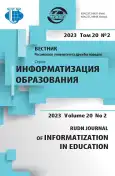Learning analytics in Russia and abroad: level of development, trends and prospects
- 作者: Kustitskaya T.A.1, Noskov M.V.1
-
隶属关系:
- Siberian Federal University
- 期: 卷 20, 编号 2 (2023)
- 页面: 150-158
- 栏目: MANAGEMENT OF EDUCATIONAL INSTITUTIONS IN THE INFORMATION ERA
- URL: https://journal-vniispk.ru/2312-8631/article/view/321278
- DOI: https://doi.org/10.22363/2312-8631-2023-20-2-150-158
- EDN: https://elibrary.ru/KEROFN
- ID: 321278
如何引用文章
全文:
详细
Problem statement. Learning analytics is an emerging scientific field, which studies learners and learning process based on data from digital environment. The aim of the study - to observe the development of learning analytics, its prospects and limitations and detecting the state of art of this scientific field in Russia. Methodology . The study is based on context analysis of scientific articles on the topic in the public domain. Special attention is given to reviewing scientific publications of Russian-speaking authors devoted to analytics of education data and the implementation of learning analytics tools in the educational process. Results . The research detects the global directions of learning analytics development and its problematic aspects. It provides the quantitative and qualitative analysis of scientific publications of Russian-speaking authors and identifiers the most popular research questions in the learning analytics field. It proposes the author’s vision of the hierarchy of directions for learning analytics development, consisting of the research aspect, the environment transformation aspect and the legal regulation aspect. The national initiatives in the digitalization of education are briefly discussed. Conclusion . A certain lag in the level of development of learning analytics in Russia from the global one is revealed. At the same time, there is a noticeable increase in interest to this area among individual researchers, educational institutions and at the state level, which allows us to count on positive changes.
作者简介
Tatiana Kustitskaya
Siberian Federal University
编辑信件的主要联系方式.
Email: tkustitskaya@sfu-kras.ru
ORCID iD: 0000-0001-9854-1259
SPIN 代码: 5202-8701
Candidate of Physical and Mathematical Sciences, Associate Professor, Associate Professor of the Department of Applied Mathematics and Computer Security
79 Svobodnyi Prospekt, Krasnoyarsk, 660041, Russian FederationMikhail Noskov
Siberian Federal University
Email: MNoskov@sfu-kras.ru
ORCID iD: 0000-0002-4514-7925
SPIN 代码: 3957-7221
Doctor of Physical and Mathematical Sciences, Professor, Professor of the Department of Applied Mathematics and Computer Security
79 Svobodnyi Prospekt, Krasnoyarsk, 660041, Russian Federation参考
- Siemens S, Gašević D. Special issue on learning and knowledge analytics. Educational Technology & Society. 2012;15(3):1-163.
- Tsai YS, Rates D, Moreno-Marcos PM, Muñoz-Merino PJ, Jivet I, Scheffel M, Gašević D. Learning analytics in European higher education - trends and barriers. Computers & Education. 2020;155. http://doi.org/10.1016/j.compedu.2020.103933
- Nouri J, Ebner M, Ifenthaler D, Sqr M, Malmberg J, Khalil M, Berthelsen UD. Efforts in Europe for data-driven improvement of education - a review of learning analytics research in six countries. International Journal of Learning Analytics and Artificial Intelligence for Education. 2019;1(1). http://doi.org/10.3991/ijai.v1i1.11053
- Olney T, Walker S, Wood C, Clarke A. Are we living in LA (P) LA Land? Reporting on the practice of 30 STEM tutors in their use of a learning analytics implementation at the open university. Journal of Learning Analytics. 2021;8(3):45-59. http://doi.org/10.18608/jla.2021.7261
- Wong BT, Li KC. A review of learning analytics intervention in higher education (2011-2018). Journal of Computers in Education. 2020;7(1):7-28. http://doi.org/10.1007/s40692-019-00143-7
- Wise AF. Designing pedagogical interventions to support student use of learning analytics. Proceedings of the 4th International Conference on Learning Analytics and Knowledge (24-28 March 2014). Indianopolis; 2014. p. 203-211.
- Wilson A, Watson C, Thompson TL, Drew V, Doyle S. Learning analytics: challenges and limitations. Teaching in Higher Education. 2017;22(8):991-1007. http://doi.org/10.1080/13562517.2017.1332026
- Belonozhko PP, Karpenko AP, Khramov DA. Analysis of educational data: directions and prospects of application. Bulletin of Eurasian Science. 2017;9(4). (In Russ.) Available from: http://naukovedenie.ru/PDF/15TVN417.pdf (accessed: 20.10.2022).
- Nazhmidinov KA. Analysis of the best practices of the use of learning analytics in the foreign universties. Proceedings of the 12th International Scientific-Practical Conference SITU (25 February - 1 March 2019). Ekaterinburg; 2019. p. 172-178. (In Russ.)
- Vilkova KA, Zakharova US. Learning analytics in conventional education: its role and outcomes. University Management: Practice and Analysis. 2020;24(3):59-76. http://doi.org/10.15826/umpa.2020.03.026
- Ozerova GP, Pavlenko GF. Prediction of student performance in blended learning utilizing learning analytics data. Science for Education Today. 2019;9(6):73-87. (In Russ). http://doi.org/10.15293/2658-6762.1906.05
- Bystrova T, Larionova V, Sinitsyn V, Tolmachev A. Learning analytics in massive open online courses as a tool for predicting learner performance. Educational Studies. 2018;4:139-166. http://doi.org/10.21125/iceri.2018.1033
- Aldunin DA. Application of the adaptive content concept for an e-learning resource. Business Informatics. 2016;(4):27-34. http://doi.org/10.17323/1998-0663.2016.4.27.34
- Kustitskaya TA, Karnaukhova OA. Developing an early warning system to detect at-risk students: a feedback mechanism. Proceedings of the 5th International Conference on Informatization of Education and E-learning Methodology: Digital Technologies in Education (6-9 October 2020). Krasnoyarsk; 2020. p. 289-293.
- Baranova EV, Shvetsov GV. Methods and tools for analysing students’ digital footprint in the course of work under educational programmes. Perspectives of Science and Education. 2021;(2):415-430. (In Russ.) http://doi.org/10.32744/pse.2021.2.29
- Alishev T, Gafarov F, Sabitova E. Academic performance and grade 9 milestone: primary data analysis in the system of ”Electronic education in the Republic of Tatarstan”. Kazan Pedagogical Journal. 2020;6:177-186.
- Tolmachev AV, Sinitsyn EV, Astratova GV. Probability distributions of the academic performance of online courses’s students as a tool for assessment of the quality of control materials. Russian Journal of Resources, Conservation and Recycling. 2020;7(3). http://doi.org/10.15862/10INOR320
- Esin TE. Development of the metric of determination probabilistic distance to solution in difficult problem areas. Modeling, Optimization and Information Technology. 2021;9(1). (In Russ.) http://doi.org/10.26102/2310-6018/2021.32.1.006
- Ozerova GP. Design and assessment self-study tasks in blended learning envirinment. Proceedings of Voronezh State University: Problems of Higher Education. 2020;2:82-86. (In Russ.)
补充文件









